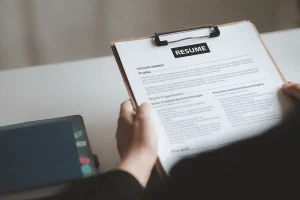For the longest time, it had been customary for job applicants to include a minimum of two references on their resume. However, in the contemporary digital landscape, this practice has become obsolete. Today, employers typically only request references during the tail end of the interview process.
With that in mind, stay active in gathering your references while you are in the process of job searching, ensuring your readiness once a potential employer requests this information. We will explore the reasons employers seek references, discuss why it is unnecessary to include them on your resume, and offer advice on how to approach someone to request their endorsement as a reference.
What is a Reference in a Resume?
References are individuals within your professional or personal network who are able to attest to your prior positions, duties, and personal attributes. Throughout the course of the job interview, employers may contact these references to gain a deeper understanding of your background and capabilities.
Why Not Include References in a Resume?
Considering how competitive job applications are — for every position, thousands of applications are received, but only a few candidates are invited for an interview — it is best to keep your references’ contact information until hiring managers ask you to list them. So, putting references in your resume early on isn’t really necessary.
Additionally, your resume has limited space, so it’s important to use that space wisely. Adding a section for references, or saying “References available upon request,” might not be the best use of that space.
Also, when you add references to your resume, it could cause problems with the software that companies use to sort through applications, commonly known as applicant tracking systems (ATS). These systems look for specific things in your resume, and having a references section might mess with that process.
With all this in mind, it’s better to leave the references off your resume. This lets you use the space for things that will really help show why you’re a great candidate from the start.

How to Write References in Resume
There are employers who might request that you provide references along with your job application, whereas others may ask for them after a phone screening, an in-person interview, or prior to the final steps of the recruitment process. Regardless of the timing, it is advantageous to have a prepared list of reputable contacts ready, who can effectively convey your most commendable professional qualities.
🔍 Think Your Resume’s Fine? Let’s Double-Check That
Even strong resumes can miss critical details—especially when it comes to passing Applicant Tracking Systems (ATS). Our specialists offer a free review to uncover gaps, improve formatting, and ensure your resume is ATS-ready and recruiter-friendly.
As you begin to gather references for prospective employers to review during the hiring process, please take into account the following actions to organize your document efficiently:
1. Choose among the list of your references in resume.
Deciding how many references to include really depends on where you are in your career. If you’re just starting out, three references should do the trick. But for those aiming for higher-up positions, it’s wise to have a beefier list showcasing contacts from throughout your career journey.
Sometimes, employers will tell you exactly how many references they want. Always stick to their instructions if that’s the case. Remember, not every reference may get a call — it could be just one or two. But, it’s good to have a mix ready to go, just in case someone can’t be reached.
2. Prepare a list that you can easily save as a PDF or attach references in resume.
Once you’ve decided on your references, make the submission process smooth by preparing a reference sheet. This neat document should gather all your references in one place, making the final steps of the hiring process faster. When needed, you can quickly attach this sheet to an email, either as a Word document or PDF, or just copy and paste the details.
Always include the following information:
- Full name
- Job title
- Company name
- Address
- Contact information (phone number and email address)
- Description of relationship to the reference
3. Ask your references if they can give you character reference.
Before you list someone as a reference, make sure to ask them first. It’s not just polite — it also gives them a heads-up to expect a call or email from your potential employer. Plus, it gives them time to think of great things to say about you, making sure they’re ready to explain just why you’re perfect for the job.
4. Format your references in resume.
Make sure your reference list matches the look of your resume and cover letter. A matching design across all your application documents adds a touch of professionalism and keeps everything looking unified.
Key Takeaways:
- Include only the persons whom you believe will talk positively about you and endorse you for the post.
- Ask people first before putting their names on your list, even if you’re sure to get their nods.
- Let your references take a look at your resume so they’ll be on the same page and be able to speak of your strengths to potential employers.
- Write the same set of information for all of your references.
- Commit no errors when writing contact details, such as phone number and email address.
Who Should You Ask to be a Reference?
Feeling confident about nailing that interview? Great! But remember, after impressing in the interview, you’ll need to provide references. Ever sat down to list them and found yourself staring at a blank page? You’re not alone. Crafting that perfect list of references can stump even the most experienced among us, despite years of work and building professional networks.
Here, we’ve listed potential references in resume that employers will trust.
1. Previous Supervisor
Including a current or previous boss in your references can really showcase your work ethic. If you decide not to include them, be sure to explain why. For example, if you’re job hunting on the down-low and don’t want your current boss to find out, try to include someone else from your current workplace.
2. Colleagues
Select a colleague who has worked closely with you and is familiar with your job if you don’t get along well with your supervisor. Selecting a coworker who lacks understanding of your field of work will not assist you in obtaining the desired professional reference.
3. Mentors or Teachers
Consider contacting a coach or teacher from high school you maintained contact with if you are low on references. They serve as mentors throughout academic years. A teacher or coach who genuinely knows you can give insights about your personal life, if you do not have work experience yet.

How to Request for References
When reaching out for a reference, keep it friendly and professional. Thank them sincerely for their time and help. Also, make sure to share key details like the company name, the job you’re applying for, and the hiring manager’s contact info. Here are important factors to consider:
1. Reach out to them ahead of time.
Inform your chosen references in advance that you intend to list them. This step also allows you to verify their contact details are current.
2. Provide background information.
Give your references a heads-up, not just out of courtesy, but to also prepare them for potential contact from employers. When they’re informed beforehand, they can thoughtfully gather standout examples of your work.
3. Share your resume.
Especially if your relationship with the reference isn’t recent, sending them your resume can refresh their memory of your achievements and the skills you want to highlight.
4. Include the job description.
For references keen on supporting your career journey, sharing the job description can help them tailor their recommendation more effectively, improving your chances for a glowing endorsement.
5. Express your gratitude.
Don’t forget to thank your references for their support. A simple acknowledgment goes a long way in maintaining positive relations.
Examples of References in Resume
When selecting references, choose individuals who can effectively highlight your skills relevant to the position you are applying for. If you are considering including someone from your current workplace, make sure first that they are aware of your job search. Should you prefer to keep your job search confidential, it is advisable not to list your current supervisor as a reference in resume.
Example of Professional Reference in Resume
Name: Susan Smith
Position: Social Media Marketing Director, North America
Company: ABC Company
Phone: 123-456-7890
Email: susansmith@abccompany.com
Description:
Susan is the head of the social media department where I served as social media marketer for 2 years at ABC company.
Reference in Resume for Students and Fresh Graduates
Professors often act as references, and it’s a straightforward task for them, taking less time than crafting a custom letter of recommendation.
Name: Emily Carter
Position: Senior Lecturer, Hamilton Department of Finance
Company: ABC College
Phone: 123-456-7890
Email: emily.carter@metcol.edu
Description:
Emily Carter played a crucial role in my academic and personal development throughout my Master of Science in Finance. As a senior lecturer, her mentorship and expertise were instrumental in deepening my understanding of complex financial concepts and practical applications.

Increase your Chances of Getting Called for an Interview with a Well-Crafted Resume
Getting a solid reference isn’t just a matter of asking nicely; it’s a whole process of its own. It involves how you build and maintain your professional connections, the recognition you’ve garnered, and the respectful and grateful way you make your request. Having a strong professional network is key to getting strong endorsements, so make sure you keep nurturing those relationships, even if you plan on looking for other companies to work at.
To excel in your job search and impress hiring managers, you need a resume that effectively showcases your qualifications. Ultimately, your resume should serve as a compelling marketing tool that effectively sells your qualifications and convinces hiring managers that you’re the perfect fit for the job. By investing in hiring professional resume writers, you can significantly increase your chances of success in your job search.









